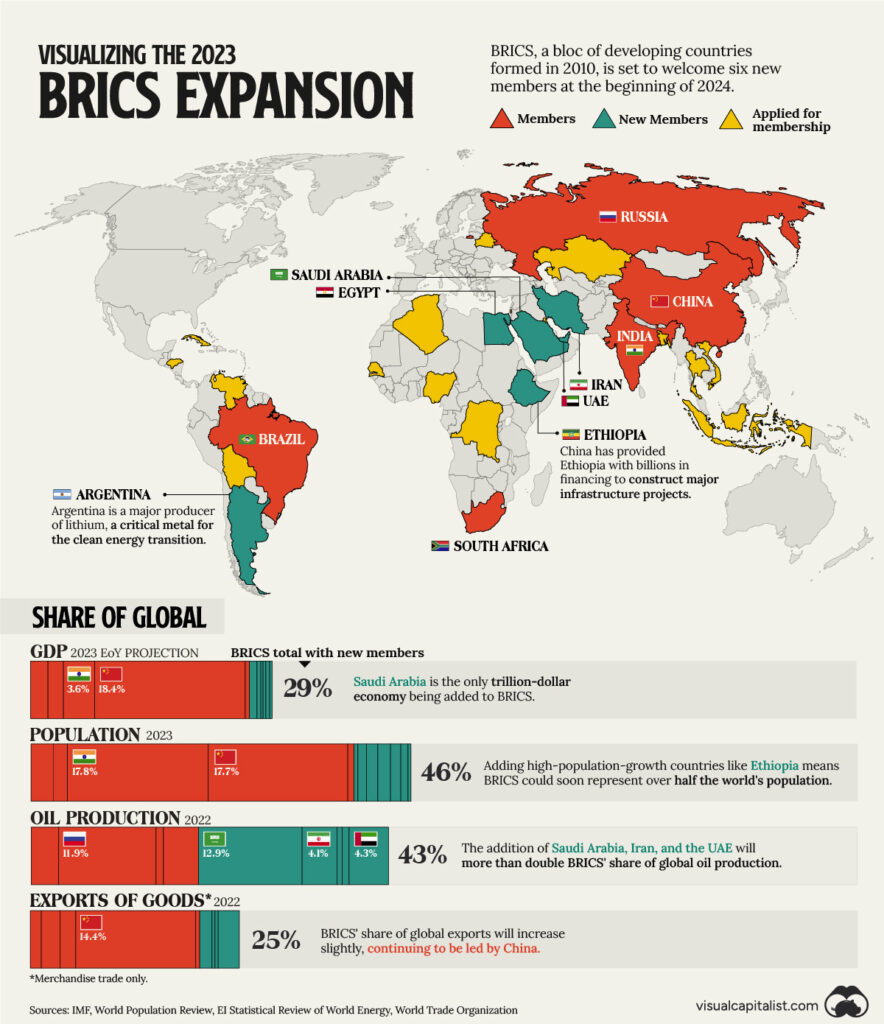The expansion of the BRICS alliance is causing ripples in the global economic landscape. As Saudi Arabia, the United Arab Emirates (UAE), Iran, Ethiopia, Egypt, and Argentina prepare to join the ranks, discussions among experts are heating up. This move is poised to transform the BRICS alliance into the group and, by 2050, potentially grant it control over nearly 50% of the global economy. This shift has implications that extend far beyond economics, reaching into geopolitics and global influence.
BRICS+ Shaping the Global Economic Landscape

Drawing on data from the International Monetary Fund for the 11 new member countries, Bloomberg’s projections suggest that the economic reach of BRICS+ could be colossal. If the alliance further expands beyond these 11 nations, their combined GDP might wield an even greater influence on the global economy. This scenario becomes even more likely considering the 20 pending applications from various countries eager to join the alliance.
Moreover, the predictions align with reports from Russian media outlets, such as RBK and TASS, which highlight the potential of BRICS‘ expanded lineup. This revamped group is expected to surpass the G7 economies in terms of economic might.
Read more: BRICS Expansion: Russian Experts Weigh In on Impact and Implications
A Global Economic Powerhouse

At present, BRICS consists of Brazil, Russia, India, China, and South Africa. However, come January 2024, this lineup will expand to include Argentina, Egypt, Ethiopia, Iran, Saudi Arabia, and the UAE. According to reports from Russian media, the collective Gross Domestic Product (GDP) of this expanded, measured using Purchasing Power Parity (PPP), could amount to around $65 trillion. This substantial figure could elevate the group’s share of the global GDP from the current 31.5% to 37%. In comparison, the G7 economies, comprising advanced nations, currently hold a share of approximately 29.9%.
Read more: Saudi Arabia, UAE, Iran, and More Set To Join BRICS in 2024
Beyond just economic prowess, the expanded BRICS is set to wield significant influence in the global agriculture sector, with nearly half of the world’s cereal production potentially under its domain. This expansion could reshape the balance of power in vital industries like high-tech metal production. The alliance’s potential to account for a staggering 79% of global aluminum production and 77% of palladium production could usher in a new era of economic strength.
Conclusion
The expansion of the alliance into BRICS+ is poised to revolutionize the global economic order. As new members join the alliance, its combined economic strength is projected to reach unprecedented heights, rivaling established economic powerhouses. However, the impact extends beyond economic figures; it has the potential to shape geopolitical dynamics and global governance. With BRICS+ on the horizon, the world witnesses a new era of collaborative economic strength, poised to leave an indelible mark on the international stage.






